 Last night I came home to my poor pup shaking like a leaf on the couch, curled in a ball. I quickly ran up to her only to find out that the entire right side of her face was swollen and she appeared to have something going on with her eye. I rushed her to the emergency animal hospital near my house, and 3 hours and $710 later the vet told us that he believed she had been bitten by a snake. I am happy to report that she is doing fine and home resting (next to me as I write this as a matter of fact!)
In addition to the scary nature of a pet emergency is the financial burden associated with it. I have said before that if you are going to engage in pet ownership you should be prepared to handle the financial responsibilities associated with it; but how many of you have an extra $700 lying around (or $3,000 like the girl in line ahead of me to pick up her cat)? I know I don’t, but I happened to have a credit card (that I just paid off), so I was able to pay with that. In any event, I wanted to let you all know that there are resources out there to help in managing the healthcare expenses of your pet. Pet health insurance It may not help in the current crisis, but you should consider purchasing pet health insurance for future medical needs. The American Humane Society recommends PetPlan, gopetplan.com. But you can also check your home state to see if they offer veterinary care assistance. Check our list of groups nationwide that are offering veterinary care assistance. Work with veterinarians Be proactive and talk to them about your situation. Many veterinarians got into the business due to their love of animals. Chances are they don’t want to see you choose euthanzia because you can’t afford their proffered treatment plan. Try to: · Negotiate a payment plan with your vet. If you're a client in good standing, they may be happy to work out a weekly or monthly payment plan so that you don't have to pay the entire cost of veterinary care up front. However, don't expect a vet you've never been to before to agree to such a plan; she doesn't know you and understandably doesn't want to get stuck with an unpaid bill. · Offer to perform a service for your vet like cleaning kennels, answering phones or other work in lieu of actual cash. · Get a second opinion. You'll pay a consultation fee, but another vet may have other, less expensive ways to treat your pet. · Use a vet in a less expensive area. Vets in smaller towns tend to charge lower fees. · Check out local veterinary schools. Many run low-cost clinics for limited income clients. The American Veterinary Medical Association's website and Veterinaryschools.comhave lists of veterinary schools by state. Also, Banfield Pet Hospital has a really great system where you can purchase an optimum wellness plan which allows you to pay monthly for a veterinary services plan that is tailored to you and your pet’s needs. Contact your local Banfield today to ask about their options. Another method may be to Explore ways to bring in some extra cash: · Have a yard sale. Not always an easy feat to plan, but if you have some animal loving neighbors and friends that are willing and able to assist this can bring in several hundred dollars. · If your birthday or a holiday is near, ask for cash in lieu of a present. · Sell things on an online auction site such as eBay. · Consider getting a second or part-time job or working for a temp agency. · Ask your employer for a salary advance. Pay with creditI for one hate credit cards….well actually I love them, which is a problem. But in an emergency (as in my situation last night) they are a blessing in disguise. If you don't qualify for a credit card or bank loan that can help you through your pet's crisis, you may still be able to get an account with Care Credit, a credit card that's specifically for health expenses, including your pet's. Care Credit offers no interest or low interest plans with fixed monthly payments that allow you to budget your money. It's accepted by many veterinarians (and human doctors as well). Groups like IMOM and RedRover also allow you to apply for financial aid if you can't afford veterinary care for your pet. Financial assistanceThere are many animal welfare organizations that can help out with vet bills, either with low-cost care, loans, or grants. Here are a few: Dog breed-specific veterinary care assistance programsCorgiAid: corgiaid.org Special Needs Dobermans: doberman911.org Dougal's Helping Paw (Scottish Terriers, West Highland White Terriers and other small, short-legged terriers): http://www.welcome.to/dougalsfund Labrador Harbor: labradorharbor.org/ Labmed: labmed.org Labrador Lifeline: labradorlifeline.org Westimed (West Highland White Terriers): westiemed.org Pyramedic Trust (Great Pyrenees): http://www.angelfire.com/bc2/pyramedic/summary.html Veterinary care assistance for working/service dogs Helping Harley Cancer Treatment Grant: http://grants.landofpuregold.com Assistance Dogs Special Allowance Program: http://www.cdss.ca.gov/cdssweb/PG82.htm More resources Still looking for help? · Contact your local animal shelter. Some shelters have onsite low-cost veterinary clinics or work with local vets who are willing to reduce their charges. Some also have veterinary loan or grant programs. · There are some organizations that may offer assistance locally (by state or community). See our state-by-state (including Canada) listing. » · Your vet can submit an assistance request to the American Animal Hospital Association's "Helping Pets Fund." In order to qualify, your animal hospital must be AAHA accredited. To learn more about the program visit the AAHA website. » Find an AAHA accredited hospital in your area. » · If you purchased your dog from a responsible breeder, check your contract to see if there is a health guarantee that covers your pet's ailment. So you see folks, just because an unexpected medical emergency arises with your pet, doesn’t mean that treatment is impossible. You may have to work a little harder, spend a little less on yourself, or come up with an alternative means to raise money, but is that really so bad compared to seeing your furry friend suffer, or worse? I think not!
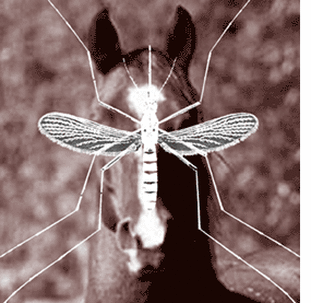 Hey there! One of our very own Fauna Farmers and local horse enthusiast alerted me to this and we thought it was a great educational piece to offer for all of you horse owners that follow us! Last year there were over 600 cases of equine West Nile virus (WNV)1 and more than 200 cases of Eastern Equine Encephalitis (EEE)! One of the worst years on record for mosquito-borne diseases. In addition to the alarming number of equine patients, more than 5,000 cases of WNV were reported in humans, resulting in 243 deaths...the highest on record since 2003 according to the Center for Disease Control! “Horse owners can become complacent when it comes to diseases like West Nile virus because if they haven’t seen it in their area recently, they simply don’t think it will happen to their horses,” says Dr. Hoyt Cheramie, Manager, Merial’s Large Animal Veterinary Services. “But what we saw in 2012 is that although the number of cases had declined during the past several years, it only takes one heavy mosquito season for the numbers to jump back up to record levels.”So how can you protect your horses?According to Dr. Cheramie the easiest thing to do is vaccinate horses from mosquito-borne diseases. “It simply isn’t worth taking a chance when it comes to diseases like West Nile virus and Eastern Equine Encephalitis,” Cheramie says. “Both of these very preventable diseases have effects that are devastating, for the horse and the horse owner.”Those of you that have owned horses for a while know that spring vaccination season is upon us, so if you haven't already, be sure to include WNV and EEE vaccines in this year's regiment; it isn't too late even if you have lapsed in your regular schedule. In addition to vaccination you can also remain informed about EEE and WNV. Remember, education and awareness are key when it comes to animal ownership! In 2011 a program was launched known as Merial's Outbreak Alert program. This is a tool for horse owners that can be used to track and evaluate equine disease risks, most notably when and if you travel with your horses. If you go to the website you can view maps that show where confirmed cases and carriers of WNV and EEE exist, as well as other diseases such as Western equine encephalitis, influenza, Potomac Horse fever, Equine herpesvirus and rabies Free, printable information about each of the diseases, their clinical signs and treatments, is also available on the website for viewers. Sign up for their free alert system to get up to date information and email/text alerts when a new disease site has been confirmed in your geographic location.“A horse can be just one mosquito bite away from becoming infected with the West Nile or Eastern Equine Encephalitis virus,” says Dr. Cheramie. “Likewise, a horse can be just one raccoon or skunk bite away from becoming infected with rabies. When horse owners recognize these diseases may exist right in their own backyards, it helps them realize the cost of vaccinating is a small price to pay for the health of their horses and peace of mind.”An additional benefit to horse owners is the “Exclusive Offers” section of the Outbreak Alert website which features special savings for members. “We know that in these tough economic times, it can be tempting to skip a scheduled vaccination,” says Dr. Cheramie. “We’re trying to do our part to help horse owners protect the health of their horses.” Chances are, not only have you spent lots of time, effort, energy and of course money on your equine companion, but for many of us our horses are our best friends. Be sure to protect them from these horrible diseases! Vaccinate and stay informed! “Horse owners have made significant investments in their horses, financially and emotionally,” says Dr. Cheramie. “Helping protect their health and well-being with an appropriate vaccination schedule is the best decision when the alternative is to cope with losing a horse or treating a horse for a preventable disease.”Enjoy your springtime friends, and happy trails with your equine buddies!
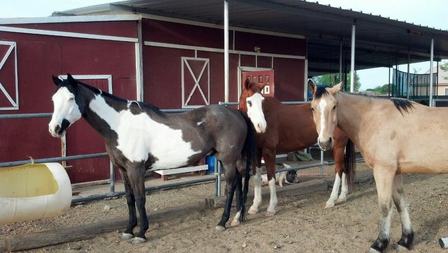 15 years ago my sister and mother were driving through the back of Turf Paradise, the notorious race track in Arizona. You see, for a period of time our family was involved with rescuing, retraining and re-homing former racehorses that were no longer of use to their owners, either due to poor stats, illness, or injury. While making their way towards the exit, they saw the most beautiful black and white paint being led by his trainer. They stopped the trailer immediately to get a better look at the handsome beast. They soon found out that the horse, Jack as he came to be known, had a long history for his short four years of life.
You see, when he was a young stud, Jack was sold at auction because he wasn't a "good breeder" (failed to throw color, despite his beautiful markings). A Canadian Hockey player then purchased him but unfortunately lost him in a messy divorce. Subsequently he was picked up by a horse trader that brought him to Arizona where he worked extremely hard at the race track until that day.
When my mom and sister saw him he was in terrible shape! His hair was chewed off, he had parasites, he was underweight and had various infections. His owner at the time was ready to send Jack to slaughter because the trader didn't have room on the trailer back to Canada. As quick as can be they bought Jack (for double what they would have gotten for his meat) and the rest is history! Jack went on to be a 4H superstar, a big fuzzy babysitter, and one of my sister's best friends. Today he is living large on an acre and a half with his two "brothers" (pictured above). The message I leave you with today, is that there are animals in need in every shape, size, color and species. From hamsters to horses, as I usually say. Though it seems that we rescued Jack, the truth of the matter is he rescued us, and boy are we happy! In closing, check out After the Homestretch, an organization that was formed to find homes for horses retiring off the race track, similar to Jack. Check them out if you or someone you know are looking to rescue a horse!
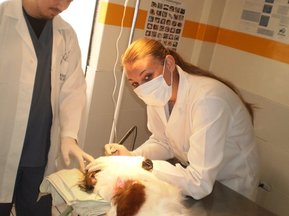 Coming from a family where veterinary medicine is "the thing" I figured it might be helpful to dedicate some blog posts to simple veterinary topics. Today's interview is with Veterinary Technician (and soon to be veterinary student) Danielle Cucuzella. We asked her some questions about basic animal care that every pet owner should know about.
Q: Danielle, tell us a little bit about yourself and your involvement with animals:
A: I am a lifelong animal lover and advocate and have worked in the veterinary field for several years. While in college I completed two undergraduate internships in large animal/equine and zoo medicine. I have been working at a local animal clinic for over two years and will soon be perusing a degree in veterinary medicine. My calling in this line of work is to educate people in order to make lives better for animals.
Q: What are some preventative measures that every pet owner should take to keep their pets healthy?
Basic preventive care for pets can differ based on location, ALWAYS consult your veterinarian to see which vaccines, de-wormers etc. are needed in your state. In our practice, the minimum amount of preventive care we want all owners to provide their pets is:
all necessary vaccines,
· flea and tick prevention,
· heartworm prevention, and
· routine de-worming.
Finally, yearly blood work is your veterinarian’s most useful tool in early detection of health issues. Pets are often brought in by owners that tell us that little Fluffy is “Just not herself”. Dogs and cats are natural predators; their instincts drive them to hide any signs of sickness and pain that would otherwise cause them to be picked off in the pack. This makes our jobs all the more difficult, because by the time Fluffy is acting abnormal, she is much sicker than her owner is willing to come to terms with. This is why blood work is so vital in diagnosing disease and sickness. If we have a history of Fluffy’s blood values, we can see trends and often times catch sickness before it has become irreversible.
Q: What about their teeth? I’ve heard of a lot of people going to the doggy dentist.
A: After reaching adulthood, over 60% of dogs and cats suffer from some form of dental disease, therefore routine dental cleanings are necessary at least once a year, more frequently for smaller breeds and geriatric pets.
Q: Many people aren’t completely “sold on the idea of fixing their pet, so what are the medical benefits of spay/neuter?
The benefits of altering your pet are numerous, but most importantly, it will give them a better life, plain and simple. First of all, the procedures for sterilization have become very safe and pets are often back to normal within a few hours of surgery. The drugs used to sedate and anesthetize pets for surgery are the same ones used in modern pediatric medicine, including Butorphanol, Propofol, Midazolam and Sevoflurane.
Intact males are at risk for sex related cancers such as testicular and prostate cancer. Castrating your dog or cat can prevent, lessen or even halt behavioral issues such as inappropriate urinating, mounting, territorialism and escape. Over 70% of dogs hit by cars are intact males. Driven by copious amounts of hormones, they escape their yards to find a mate and breed.
Similarly, intact females are prone to mammary cancers, reproductive tract cysts and uterine infections known as pyometra. Bitches can go into heat two or more times a year, for several weeks at a time, this is a long, uncomfortable, messy and expensive experience for both dogs and owners alike. Cats on the other hand are known as spontaneous ovulators, meaning that their ovaries release an egg each time copulation occurs. Therefore, female cats can become impregnated once she weans her current litter, resulting in four or more litters a year!
Switching gears a bit, I know I wash my hair everyday as do most humans, but the same can’t be true for animals, so the question is how often should I bathe my dog?
Your dog naturally secretes oils that coat his skin and acts as a natural water repellent sun screen and skin conditioner. To avoid upsetting this delicate chemical balance, it is not recommended to bathe your dog unless necessary. If your pet is active and needs bathing frequently, do not exceed two baths per month, and always test a shampoo before bathing your dog by washing a small area (A paw, tail or rump are a few easy areas) to avoid any systemic allergic reactions.
There are just about as many dog shampoos on the shelf in pet stores as there are in the beauty aisle at Walmart, this can make your decision difficult. Allow me to help, walk out of the aisle! You should always get a shampoo recommended by your veterinarian, many of which carry a line of veterinary tested and approved cleansers. Over the counter shampoos and conditioners are much like human soaps, they are formulated to smell appealing, make the skin and hair soft and also dampen oil production. These are all great for your average human who bathes each day and uses artificial moisturizers, but can be very harmful to your pets overall health.
| 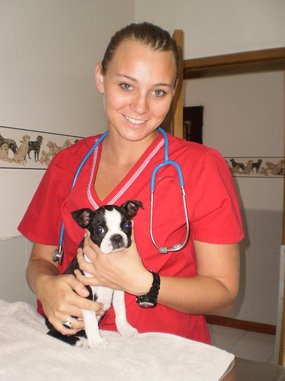 Q: And switching gears once more, recently Fauna Farms has been follow a slew of breed specific legislation and sharing such with our followers. Keeping with that topic but not in a legal sense, do you believe certain breeds are inherently aggressive or dangerous?
This is a trick question because aggression is not a breed trait; curly fur, long whiskers and floppy ears are. Aggression is not inherited, it is learned. Some breeds have a reputation of being “inherently aggressive”, a phrase coined by today’s story-hungry media, but this is an inaccurate and ignorant statement. Some breeds are bred based on their strong, ingrained instincts; terriers for their hunting abilities, hounds for their tracking skills, and bully breeds for their innate loyalty. This is where certain breeds receive their stereotypes.
Let us take American Pit Bull Terriers for example, a breed originating in early America, designed to protect the families of business men and soldiers when they were away. The breed was specifically modified to be the ultimate security system, trained to bond to their owners and give their life if necessary. These dogs were often left in nurseries, churches and backyards to protect playing children from intruders and wild animals.
Dog fighters have taken advantage of these admirable traits and are tailoring the breed to have more stamina, higher muscle volume and wider jaws. The combination of a “tougher” looking dog, and their do-as-they’re-told instinct, have lea to many cases of wrongfully accused dogs, often put to death for simply doing as they are asked by the one who is supposed to provide love, shelter and protection in return.
On an average day I personally handle about 30 or more pets and commonly encounter aggressive dogs. Of all of these animals, I can recall only two “aggressive pit bulls”. The first was a one year old, intact male who had been chained to a tree his entire life, eating scraps and living in his own filth. I was unfortunately one of the first human he encountered and was forced to poke and probe him. I was able to gain his trust by feeding him a few milk bones and then completed his necessary treatments. The second was another dog faced to fend for herself outside and got such a bad sun burn that her skin blistered, became infected and began to slough off. She was in such a great amount of pain she became defensive. She, and the first dog are now each in new homes, who love them both dearly and I see them both regularly for preventive care and milk bones.
So let us do some math, 30 animals a day, five days a week, 52 weeks a year, over the last two years makes 15,600 animals, of which two have been American Pit Bull Terriers showing signs of aggression. In that time I have sustained memorable bite wounds five times; two times by a cat, two times by Chihuahuas and the final time by a golden retriever. In fact, I would estimate that one in two Chihuahua, Shih Tzu and Yorkshire Terriers I handle have to be muzzled for their exams as they are accurately categorized as “ankle biters”. In short, believe not what the media portrays, but please do your own research. Ask a knowledgeable professional for a true interpretation of a breed, after all, we are the ones who see them each at their worst.
Q:Alright, last question I have has to do with at home care, specifically what should every pet owner keep in their pet first aid kit?
Let me start by saying, DO NOT attempt to treat your own pet for an illness or injury. I cannot tell you how many times owners have brought pets in for a simple ear infection, rash or stomach upset that has been made much worse (and much more expensive) by well-meaning owners, using internet remedies to self-treat. All owners should however know how to act in an emergency situation and have a first aid kit ready at all times.
Such a kit should include:
· A clean towel or blanket in case you need to stop major bleeding for transport
· A small, inexpensive clipper can be useful to assess wounds and find where any blood or fluid is coming from
· An extra collar and leash can come in handy if your pet breaks free of their own or you stumble upon a stray in need of rescuing
· An emergency kit should always include a muzzle, as injured animals instinctively become aggressive in self-preservation situations and can inadvertently bite their owner or rescuer.
· A splint and/or ace bandage or vet wrap can all be useful in the event that your pet has injured a limb and you need to stabilize it on your way to the veterinarian. Let me caution you, bandaging is a much more difficult task than most owners know and it takes much practice. An incorrectly placed bandage can cut off circulation and cause permanent damage, ALWAYS let the professionals bandage a pet in need and never rely on your own wrapping skills without proper training.
· Finally, your emergency kit should include the numbers of your primary veterinarian as well as the closest emergency and/or 24 hour clinic to ensure you can get your pet help without any pause
I would like to thank Danielle for sharing her time, knowledge, and most of all her dedication to animals. I hope you all learned a thing or two from today’s interview! I know I did!
If you have follow up questions or would like to ask an additional question, send us an email or comment and we will either respond or address it in the next part of the series!!!
|
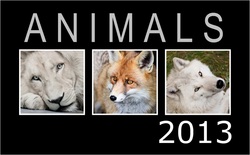 Thanks to For Pet's Sake I stumbled across some amazing dates and animal events that I didn't even know about!
Here is a list of dates for a variety of animal celebrations. (Lesson plans for educators that encourage responsible pet care and promote a special day, week and month-long celebration can be found on the ASPCA website.)
January All month: Adopt-a-Rescued Bird Month ( ASPCA) January 6: National Bird DayJanuary 20th: National Penguin Awareness Day January 22nd: National Answer Your Cat’s Question Day FebruaryAll month: National Prevent a Litter Month ( HSUS), Pet Dental Health Month ( AVMA), Responsible Pet Owners Month All month: Responsible Pet Owners Month All month: Pet Dental Health Month February 7th - 14th: Have a Heart for Chained Dogs Week February 14th: Pet Theft Awareness Day ( Last Chance for Animals) February 20th: Love Your Pet Day February 22nd: Spay Day ( Doris Day Animal Foundation) February 23rd: International Dog Biscuit Appreciation Day MarchAll month: Adopt-a-Rescued Guinea Pig Month ( ASPCA) March 6-12: National Pet Sitters Week March 17-19: Big White Dog Dart Tournament (benefits NWA animal welfare organizations) AprilAll month: Animal Cruelty Prevention Month ( ASPCA) All month: National Pet Month All month: National Pet First Aid Awareness Month ( First Aid Info) April 2nd: National Ferret Day, Tag Day ( American Humane) April 10th: ASPCA founded in 1866 April 17th-23rd: Animal Cruelty/Human Violence Awareness Week ( HSUS) April 18th - 24th: National Pet ID Week April 26th: National Kids & Pets Day MayAll month: Chip Your Pet Month ( Home Again Pet ID) May 1st - 7th: Be Kind to Animals Week ( AHA), National Pet Week May 3rd: National Disabled Pets Day May 14th: Animal Disaster Preparedness Day May 13th - 19th: National Dog Bite Prevention Week JuneAll month: Adopt-a-Shelter Cat Month (ASPCA)June 5th - 11th: Pet Appreciation Week June 12th: World Pet Memorial Day June 19th - 25th: Animal Rights Awareness Week June 24th: Take Your Dog to Work Day JulyAll month: Adopt a Shelter Rabbit Month, Dog House Repairs Month
July 14th: Cow Appreciation Day
August All month: National Chicken Month, National Save the Tiger Month
September 11th: National Pet Memorial Day
September 18th - 24th: Farm Animal Awareness Week, National Dog Week
September 23rd: Dogs in Politics Day
October All month: Adopt a Senior Pet Month ( ASPCA) Adopt a Turkey Month ( Farm Sanctuary) November 6th - 12th: National Animal Shelter Appreciation Week ( HSUS) DecemberAll month: Hold a fundraising sale for your local animal shelter for the holidays! December 10th and 11th: NWA Kennel Club Show
 Hello Followers! Wow it sure has been a while since we have had a blog! Sorry about that; sometimes life gets busy! But fear not, we are back and ready to provide you with some blog-tastic news! A few weeks back I was browsing my personal facebook page, as I usually do when I should be completing one of a million tasks I have on the average day....In any event, I ran across a post from a rabbit rescue, Tranquility Trail, in Scottsdale Arizona saying that they had gotten word that Trilogy Community housing development in Gilbert, AZ was going to be giving away baby bunnies at its Easter event on March 30th (which it had also done last year). I literally could not believe it. Who does such a thing? I don't even like the idea of giving away goldfish as prizes (which hopefully will soon be illegal), but a rabbit is 10000 times more difficult to care for, especially for a child. Rabbits are fabulous! I love my two like you couldn't even imagine. My boyfriend and I are very proud bunny parents, but I cannot begin to tell you how much care, time, effort, energy and MONEY it takes to properly parent a rabbit. As a seasoned animal owner even I was ill prepared for rabbit ownership, I can't imagine what people who are handed a free rabbit at an event would do. Contrary to popular belief rabbits cannot be kept in a tiny little cage like hamsters, they need ample room to run and hop. Our rabbits have our entire backyard to run around in during the day when we are home, and they come play in the living room at night, and at bedtime they are put in their 9' x 4' hutch. They are on a special diet of timothy hay and pellets, with only a few veggies a week (also a misconception). I could go on and on about the special needs or rabbits and why they make terrible Easter presents, ESPECIALLY FOR CHILDREN, but you could read for yourself at your leisure. Anyway...I did what any concerned animal lover would do and I attempted to contact Trilogy to get the scoop. No surprise...they didn't answer and I reached the voice mail box of the former activities director that was supposedly "no longer with the company." Hmmm...so I decided to contact Trilogy Golf Club, and then the Landscaping Company that was sponsoring the event. The owner of the golf club assured me that they were not involved with the event nor did they know what I was talking about. I thanked them for getting back to me and explained that many of us associate the Trilogy community with the golf club, for their information. I got in touch with the local news outlets and found a reporter willing to work with me to investigate and cover the story. I subsequently contacted the Trilogy community via facebook. A short time later I received a vague response telling me that once all the homes were sold that they had no control over community matters and that was the HOA's responsibility. To which I kindly replied that there would be a reporter present at the event and that regardless of the community politics, their name would be associated with the terrible event. A few hours later, low and behold I received an email from the Director of the HOA saying that " the activity involving petting rabbits and then giving them away has been immediately removed from our Spring Carnival event at Trilogy at Power Ranch..."
Needles to say I was pretty darn excited. The point of this blog is to let you all know that you can make a difference in the lives of animals. You don't necessarily have to adopt, foster or donate money. Of course all those things help the cause, but not all of us are able to give in that way. You can always write a letter, sign a petition, use your networking abilities to connect donors to organizations in need. There are countless things each and every one of us can do to help animals.
I challenge you to think outside of the box; sit down and think about all of the skills you can contribute and maybe use one of those skills to help!
So what are you going to do today to help a furry, fuzzy, scaled, or feathered friend in need?
 Today I received a text message from an acquaintance telling me they need to get rid of their dogs. Get rid of their pets. Get rid of someone that has been a part of their family for years. Get rid of them like a stack of expired magazines. I proceeded to lend my helping hand as I always do, but not without a pit in my stomach and fury in my heart.
Sometimes life puts us in less than perfect situations where we must do things we aren't proud of, take actions we wouldn't normally choose. But NEVER will my animals suffer because I made poor decisions in life, or because I was dealt a bad hand. I will not give my dog away because I have a baby. I will not take my rabbits to the pound because my landlord doesn't want them here. I will always choose the situation that is the BEST for my animals, no matter what....and if you are reading this, you likely agree.
I ran across this poem today and after drying my tears, I realized that this puts into words what so many of us do everyday....self sacrifice. Whether your mission is spay neuter, adoption, or spreading awareness, we are all in this together. And although the poem alludes to the fact that rescue isn't saving the world, a small part of me believes that is exactly what we do when we engage in selfless acts to save, nurture and love a creature that started out life with a less than perfect hand.
Grab some tissues. I hope you enjoy!
I am an Animal Rescuer.
I will never bring about world peace.
I'm not a brain surgeon and I'll never transplant an organ to save a life.
I don't have the ear of a powerful politician or world power.
I can't end world hunger.
I'm not a celebrity, and God knows I'm not glamorous!
I'm not looked up to by millions around the world. Very few people even recognize my name.
I'll never win the Nobel prize.
I'll never save the rain forest or end global warming.
There are a lot of things that I'll never do or become.
But today I placed a dog!
It was a small, scared, bundle of flesh and bones that was dropped off in a shelter by unfeeling people that didn't care what happened to it, but yet who were responsible for it even having existence in the first place.
I found it a home.
It now has contentment and an abundance of love. A warm place to sleep and plenty to eat. A child has a warm fuzzy new friend who will give them unquestioning devotion and teach them about responsibility and love.
A wife and mother has a new spirit to nurture and care for. A husband and a father has a companion to sit at his feet at the end of a hard day of work and help him relax and enjoy life. And a sense of security, that when he is gone all day at work, that there is a protector and a guardian in his home to keep watch over his family.
No, I'm not a rocket scientist but today I saved one of God's precious creatures. Today, I made a difference!
I am an animal rescuer.
My job is to assist God’s creatures.
I was born with the need to fulfill their needs.
I take in new family members without plan, thought or selection.
I have bought dog and cat food with my last dime.
I have patted a mangy head with a bare hand.
I have hugged someone vicious and afraid.
I have fallen in love a thousand times.
And I have cried into the fur of a lifeless body.
I have animal friends and friends who have animal friends.
I don’t often use the word “pet.”
I notice those lost at the road side, and my heart aches.
I will hand raise a field mouse and make friends with a vulture.
I know of no creature unworthy of my time.
I want to live forever if there aren’t animals in Heaven.
But I believe there are.
Why would God make something so perfect and leave it behind?
We may be master of the animals, but the animals have mastered themselves.
Something people still haven’t learned.
War and abuse make me hurt for the world, but a rescue that makes the news gives me hope for humankind.
I am part of a quiet but determined army, making a difference every day.
There is nothing more necessary than warming an orphan.
Nothing more rewarding than saving a life.
No higher recognition than watching them thrive.
There is no greater joy than seeing a baby play, who only days ago was too weak to eat.
I am an Animal Rescuer
* Based on the poem by Annette King-Tucker.
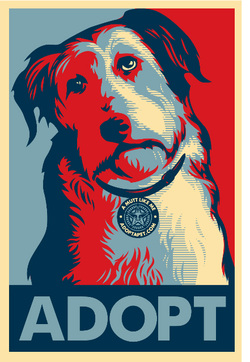 So often I hear people complain that adopting an animal is "just as expensive as buying a purebred", but what may people don't realize is the costs associated with rescuing these animals from various degrees of poor conditions can be insurmountable at times. Bless shelters and rescue organizations for their selfless efforts, and many times financial contributions from their own volunteers! Though adopting a pet is not cost free or even cheap, I will say that it is money well spent! Not to mention, if you have chosen to take on the responsibilities associated with pet ownership, then you have to be financially responsible enough to include them in your budget! Food, shelter, veterinary care, and emergency situations should all be budgeted for when you enter into pet ownership. You wouldn't adopt a child without thinking these things through would you?! Let us hope not! Anyway...back to my original point... When you buy from a breeder you get a handshake and a "thanks for doing business with ya". Many dogs from breeders don't come spayed/neutered, micro-chipped or vet checked; if you're lucky they have had their first series of puppy shots....again, if you're lucky. You are basically paying for the notoriety of the breed. Look, I get it...everyone....well not everyone, certainly not me....but a lot of people like the idea of a designer dog. Thank you Paris Hilton! But you don't have to pay $2,000 to get, let's say a french bulldog from some backyard breeder. LOOK INTO RESCUES!!! For instance French Bulldog Rescue Network has tons of adorable, lovable adoptable frenchies just waiting for a home! All designer! Anyhow, I digress.... On the other side of the spectrum from breeders is adoption! When you adopt from a reputable shelter or rescue you are getting an animal that has been seen by a veterinarian, given its proper vaccinations, many times they are micro-chipped, and of course spayed/neutered. WINNER!!! But have you ever stopped to think about who pays for these things? If only there were a spay/neuter fairy... Or if Santa had a cousin name Steve that flew around in the middle of the night inoculating shelter pets from disease, existed; But let's face it friends, that is just not the case! The funds come from donations, adoption fees, and sometimes the generosity of a wonderful veterinarian! To give you a better picture of the financial aspect.... I was recently reading on Halo Animal Rescue's website about how money is allocated in a shelter. I thought it would be a great share for all of you! Also, if you want to see donations and adoptions at work check out It's the Pits and two of their recent rescues, Petey and Capone. These two boys have a tragic background, but thanks to the AMAZING efforts of ITP they are on their way to happily ever after! So next time someone says "adopting a pet is too expensive", remind them that they are getting what they pay for, and again it is money well spent!
 So what is the big deal about spaying or neutering your pet anyway? Well…there are many answers to this question and that is exactly what today’s blog is about! First of all what is spay and neuter? Spaying is a term used to describe the ovariohysterectomy of a female animal. Neutering is a general term used to describe the castration of a male animal. Both are surgical procedures done by a veterinarian that makes the animal unable to reproduce. How old does my pet have to be? According to the American Humane Association, both spay and neuter procedures can be performed on healthy pets as early as 8 weeks of age. It is always a smart idea to check with your veterinarian and have your puppy or kitten evaluated to determine whether or not spay/neuter is appropriate for them at that age. So here’s the big question….Why should I fix my pet?Well the most compelling reason is to prevent pet overpopulation. Animal shelters nationwide are full of cats and dogs, and unfortunately there just aren't enough homes to go around. This results in approximately 3.7 million animals are euthanized at shelters each year simply because there are not enough homes to support the overpopulation of these animals. So if you make the responsible choice to sterilize your pet you will not be contributing to this vast problem. "Well that will never happen to my pet…."I often hear people say, well Spot is our only dog so he has no chance of producing any puppies….and then a few weeks later I hear that Spot got out of the fenced backyard and was missing for a few days. It is a great possibility that Spot found Fluffy and they are now expecting. Just yesterday I was trying to help find homes for some puppies because the owners dog was impregnated in basically the same scenario. The puppies are being taken to the pound this weekend if they don’t have homes; you can likely guess what will happen to them. You can’t plan for everything, especially when it comes to pets; but you can make the responsible choice to spay or neuter your pets in order to eliminate this potential. "But I have heard so many bad things about spay/neuter…." The truth of the matter is the benefits far outweigh any risks associated with spaying or neutering your pet. Of course with any surgical procedure there are risks, but this is why going to a highly trained veterinarian or a clinic specializing in spay neuter is in your pets best interest. - Spaying and neutering can help your cat/dog live longer
- Spaying will eliminate your dog or cat going into heat; specifically the mess that is associated with a female dog’s heat cycle.
- Neutering male animals can eliminate certain behaviors such as humping, spraying (cats) or marking (dogs) as well as aggression issues and the urge to roam.
- If you have more than one pet, spaying/neutering will generally help them to get along better.
- Studies have shown that spaying prior to the first heat cycle in females can eliminate the risk of cancer.
- Also, neutering males can prevent testicular cancer and prostate problems (something we don’t generally think about with our pets)
"But it is just so expensive…." It frustrates me to no end to hear this excuse. First of all when you chose to get a pet you contracted to provide care, shelter and nourishment for that pet; part of that care includes their health. You should never get an animal without being properly educated and equipped to care for them, this especially includes spay and neuter. Also, almost every state I have ever looked in to has low cost (sometimes FREE) spay and neuter programs. You should contact your local shelter to find out if there is a service near you, or drop me a line below and I will be sure to help! If you want to talk about costs, lets talk about how much it might cots to feed, de-worm, and vaccinate an unplanned litter of puppies or kittens; upwards of $200 to $300 per litter (perhaps more depending on the number of puppies/kittens). Or let’s say that there are complications with the pregnancy or birth…that has the potential to be an enormous vet bill! " But just one litter won’t hurt…" Yes…yes it will. As mentioned above, there are not enough homes for the MILLIONS of pets that get euthanized yearly. Just because an animal is a purebred does not mean that they too won’t end up in a shelter. In fact, go to your local animal shelter’s website and look through the roster of dogs, many of them are purebred; 25 percent of them in fact. "But won’t animal shelters take care of the extra pets?" Well yes and no. What's your definition of "take care"? Yes in the sense that they will do their best to place them, but those that don’t find homes will be euthanized. Only spaying and neutering can end the overpopulation problem; so please do your part. Spay and neuter your pets & spread the word to friend and family members with pets. If you have any questions please contact fauna farms or visit some of the resources below! American Humane PAWS Found Animals
|



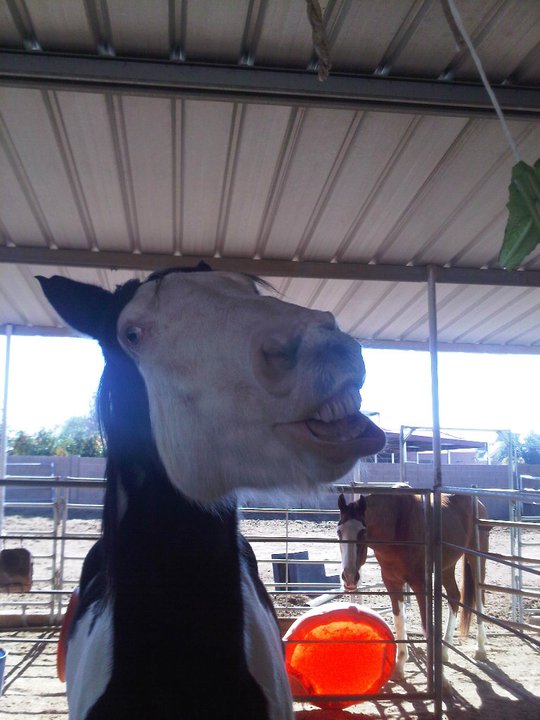








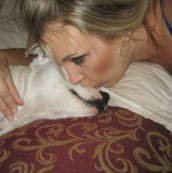
 RSS Feed
RSS Feed